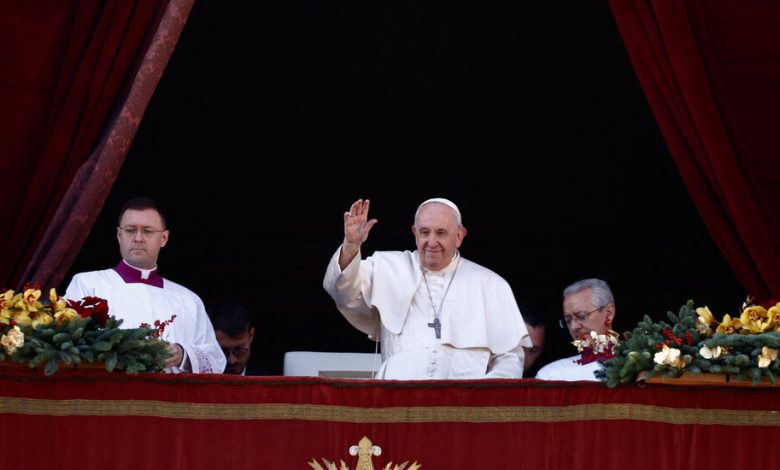In Christmas Address, Pope Bemoans ‘Grave Famine of Peace’

Pope Francis used his Christmas address from a balcony overlooking a crowded St. Peter’s Square on Sunday to call for “concrete gestures of solidarity” with besieged Ukrainians living through the holiday “in the dark and cold, far from their homes due to the devastation caused by 10 months of war.”
Lamenting that the “icy winds of war continue to buffet humanity” in an era scarred by a “grave famine of peace,” Francis meditated in his 10th Urbi et Orbi — or “to the city and to the world” — Christmas blessing on the birth of Jesus as a symbol of peace.
Francis, who turned 86 last week and now switches between a wheelchair and a cane in public appearances, urged the tens of thousands of faithful in the square to “follow that road” away from a “world closed in on itself and oppressed by the dark shadows of enmity and war, to a world that is open and free to live in fraternity and peace.” Speaking specifically about the suffering in Ukraine caused by Russia’s unprovoked invasion, he called on God to “enlighten the minds of those who have the power to silence the thunder of weapons and put an immediate end to this senseless war.”
He did not mention President Vladimir V. Putin of Russia by name.
Francis now regularly speaks out against war, but it has taken him a long and fitful time to find his voice.
Driven by hopes of maintaining the Vatican’s traditional aversion to picking sides in conflict to potentially play a role in an eventual brokering of peace, as well as by an entrenched anti-NATO bias in some corners of the Vatican, Francis has studiously avoided naming Mr. Putin, or even Russia itself, as the aggressor. Only at the end of August, amid questioning about whether the pope was risking his moral authority, did the Vatican issue a statement saying “the large-scale war in Ukraine” was “initiated by the Russian Federation.” It insisted Francis’s condemnation was “unequivocal.”
Earlier that month, he had infuriated Ukrainians by calling Daria Dugina, a 29-year-old Russian ultranationalist who spoke out in favor of the invasion of Ukraine, an “innocent” victim after she was killed in a car bombing. In September, Francis, who incessantly criticizes the arms trade, said it was acceptable for countries to provide weapons to Ukraine so that the country could defend itself. Self-defense in the face of aggression, Francis said at the time, was “not only lawful, but also an expression of love of country.”
More recently, he has spoken about the “battered Ukrainian people,” but then, in a November interview with the Jesuit magazine America, he said he had received “much information about the cruelty of the troops” in the war in Ukraine.
But despite ample public information and investigations into the behavior of the Russian troops, including mass killings, Francis added, “As a rule, the most cruel, perhaps, are those who are from Russia but do not adhere to the Russian tradition, such as Chechens, Buryats and so on.” Many Chechens are Muslim. Buryats are a Mongol ethnic group who traditionally follow Buddhist and shamanic beliefs.
Besides prompting perplexity in the West, Francis’s remarks infuriated Russia, which demanded an apology from the Vatican. Its diplomats reached out to Moscow and apparently apologized.
This month, Francis appealed to the faithful to spend less money on their Christmas gifts and parties and to send the saved money to Ukrainians struggling through the frigid winter.
And in remarks ushering in the holiday at a Christmas Eve Mass before thousands of faithful packed in St. Peter’s Basilica, Francis lamented the consumerism that risked emptying the holiday of its meaning, and blamed the sins of greed and the thirsts for power for causing some leaders to want to “consume even their neighbors.”
To avoid standing for too long on Saturday, Francis delegated much of the celebrating of the ceremony to a cardinal. On Christmas Day, he stood with the help of a cane from the basilica balcony overlooking the square.
Moving beyond Ukraine on Sunday, he touched on other “theaters of this third world war” around the globe.
“Let us think of Syria, still scarred by a conflict that has receded into the background but has not ended,” he said. He mentioned the suffering of the people of Haiti and the increasing violence in the Holy Land, and he urged a divine intervention to rebuild “mutual trust between Israelis and Palestinians.” He urged an end to the conflict and violence tearing apart the coexistence of people with different cultures and traditions in northern Africa, prayed for a lasting truce in Yemen and for reconciliation in Myanmar and Iran.
Francis also noted how the war in Ukraine had aggravated the risk of famine around the world, especially in Afghanistan and the countries of the Horn of Africa, and he argued that money that could go to feeding the hungry went to arming soldiers.
“We know that every war causes hunger and exploits food as a weapon, hindering its distribution to people already suffering,” he said, urging, political leaders to commit “to making food solely an instrument of peace.” But he did not say which leader he was referring to.
Francis also emphasized past hallmarks of his papacy, including care for migrants and the destitute, calling the world “sick with indifference,” and unwelcoming to Jesus as it is to “many foreigners” and the poor.
“Today, may we not forget the many displaced persons and refugees who knock at our door in search of some comfort, warmth and food,” he said. “Let us not forget the marginalized, those living alone, the orphans and the elderly who risk being set aside.”
